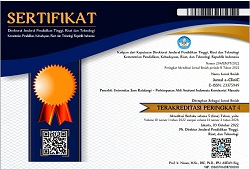Hubungan Pola Konsumsi Minuman Berkafein dengan Fungsi Kognitif pada Lansia di GKJ Gondokusuman Yogyakarta
DOI:
https://doi.org/10.35790/ecl.v8i2.31432Abstract
Abstract: Elderly population which continues to increase in number every year causes various social, economic, and health problems inter alia cognitive dysfunction. One of the efforts that can prevent and slow down the decline in cognitive function is consuming caffeinated beverages. This study was aimed to evaluate the relationship between the pattern of caffeinated beverage consumption and cognitive function among the elderly at GKJ Gondokusuman in Yogyakarta. This was an analytical observational study with a cross-sectional design. We used the modified Food Frequency Questionnaire (FFQ) to measure the consumption patterns of caffeinated beverage meanwhile the cognitive function was measured by using the Mini Mental State Examination (MMSE) and the Clock Drawing Test (CDT). Sample size was determined by using the total sampling method. There were 54 samples of elderly population. Data were analyzed by using the Spearman correlation test which obtained (p=0.023; r=-0.309) for the relationship between caffeinated beverage consumption pattern and cognitive function measured with the MMSE, and (p=0.075; r=0.244) for the relationship between caffeinated beverage consumption pattern and cognitive function measured with the the CDT. In conclusion, there was a significant relationship between caffeinated beverage consumption pattern and cognitive function measured with the MMSE, however, there was no significant relationship between caffeinated beverage consumption pattern and cognitive function measured with the the CDT.
Keywords: caffeinated beverage consumption patterns, cognitive function, elderly
Abstrak: Populasi lanjut usia (lansia) yang terus mengalami peningkatan setiap tahunnya menimbulkan berbagai masalah sosial, ekonomi, dan kesehatan, antara lain gangguan fungsi kognitif. Salah satu upaya untuk mencegah dan memperlambat penurunan fungsi kognitif ialah dengan minuman yang mengandung kafein. Penelitian ini bertujuan untuk mengetahui adanya hubungan pola konsumsi minuman berkafein dengan fungsi kognitif lansia di GKJ Gondo-kusuman. Jenis penellitian ialah observasional analitik dan desain potong lintang. Pola konsumsi minuman berkafein diukur dengan Food Frequency Questionnaire (FFQ) yang telah dimodifikasi, sedangkan fungsi kognitif diukur dengan Mini Mental (MMSE) dan Clock Drawing Test (CDT). Penghitungan besar sampel dengan metode total sampling mendapatkan 54 sampel dari populasi, yaitu lansia di GKJ Gondokusuman. Hasil analisis data menggunakan uji Spearman terhadap hubungan antara pola konsumsi minuman berkafein dengan fungsi kognitif yang diukur dengan MMSE mendapatkan (p=0,023; r=-0,309) sedangkan dengan fungsi kognitif yang diukur dengan kuisioner CDT mendapatkan (p=0,075; r 0,244). Simpulan penelitian ini ialah terdapat hubungan bermakna antara pola konsumsi minuman berkafein dengan fungsi kognitif lansia yang dinilai menggunakan MMSE, namun tidak terdapat hubungan bermakna dengan fungsi kognitif lansia yang dinilai menggunakan CDT.
Kata kunci: pola konsumsi minuman berkafein, fungsi kognitif, lansia
Downloads
How to Cite
Issue
Section
License
COPYRIGHT
Authors who publish with this journal agree to the following terms:
Authors hold their copyright and grant this journal the privilege of first publication, with the work simultaneously licensed under a Creative Commons Attribution License that permits others to impart the work with an acknowledgment of the work's origin and initial publication by this journal.
Authors can enter into separate or additional contractual arrangements for the non-exclusive distribution of the journal's published version of the work (for example, post it to an institutional repository or publish it in a book), with an acknowledgment of its underlying publication in this journal.
Authors are permitted and encouraged to post their work online (for example, in institutional repositories or on their website) as it can lead to productive exchanges, as well as earlier and greater citation of the published work (See The Effect of Open Access).







